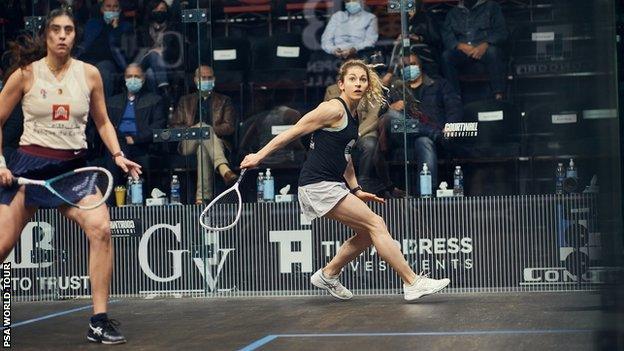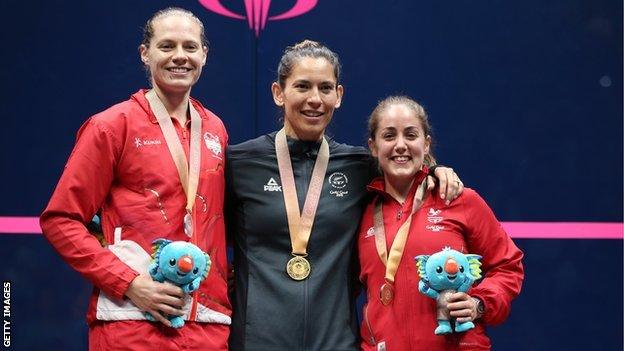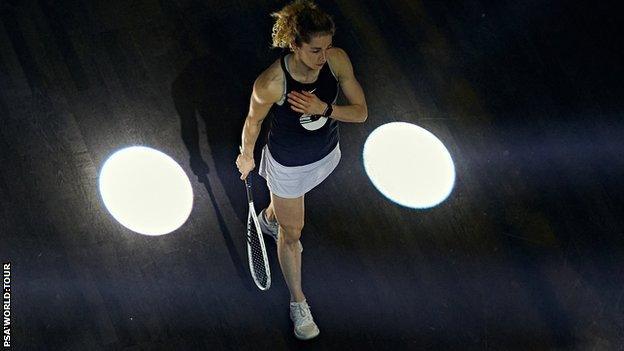Georgina Kennedy targets Commonwealth Games medal after meteoric rankings climb
- Published

Georgina Kennedy, right, rose from 185 last May to world number 10 in February
One of England's brightest new squash stars has set her sights on a Commonwealth medal after a rapid rise up the rankings to become one of the world's elite players.
Georgina Kennedy will compete for up to three medals at the home Games in Birmingham this summer having shot up from 185 to the top 10 in less than a year.
The 24-year-old did not even intend to turn professional when she began studying at Harvard University but realised she "had an itch to scratch" for squash during her second year, yet still completed her studies and is now undertaking a part-time masters in health psychology.
Kennedy, who is now England's number two and world number 11 ranked female player, said she would not have dreamed of hitting such heights in this short a time period.
Allow X content?
This article contains content provided by X. We ask for your permission before anything is loaded, as they may be using cookies and other technologies. You may want to read X’s cookie policy, external and privacy policy, external before accepting. To view this content choose ‘accept and continue’.
"A year ago, one of my main goals would have been to be selected for the Commonwealth Games," she told BBC Sport.
"I did not expect to be the number two in England at all, so one of my main goals was to prove myself so I could be taken as a wildcard pick.
"Given that squash isn't in the Olympics, it's our biggest spectacle and given it's a home Games as well, a lot of my friends and family will want to come and watch.
"[It's] really high in my list of ambitions. Success in the Commonwealths would mean just as much as performing well at the World Championships, so that is my main goal."
Difficult beginnings
Unlike many sporting professionals, Kennedy did not always have ambitions to turn her love of the game into a career.
Having secured a place at Harvard to study psychology and economics, she went on the world squash tour as a professional on her gap year before.
"I wasn't in the mindset for it and didn't enjoy it at all," she said.
"So many people go straight into it and they know it's what they want to do, and that was definitely not my path.
"For me, it was really helpful to take myself away and do things other than squash because I found in that first year that I did it before uni, when I had nothing else to do, I really struggled.
"I needed to set it aside and do other things to realise that was what I wanted to do and I feel now that I will happily invest totally in it and do the things all athletes need to do.
"That was why I hated my gap year so much because all my friends were at uni and I just felt alone.
"Being a pro athlete is difficult, it's a lot of alone time. When all my friends were at uni looking like they were living their best lives, I definitely had doubts - but now I'm really invested."

Sarah-Jane Perry, left, won a silver medal for England at the 2018 Commonwealth Games in Australia's Gold Coast
Taking advantage of Covid break
It was in her final year at Harvard that Kennedy decided she would turn professional on completion of her studies in 2020.
But with the Covid-19 pandemic hitting in March that year, the tour was halted.
Having not competed while studying, Kennedy used the year break to her advantage, training to improve aspects of her game so she was ready when tournaments resumed last year.
She became part of the PSA World Tour, which pays male and female competitors equal prize money in its tournaments, with both sets of players competing in the same best-of-five-games format.
Her big break came in June in the Squash on Fire Open in Washington DC, where she entered on a wildcard and beat the top seed and the current world number 14 Joshna Chinappa, and world number 24 Sabrina Sobhy on the way to the final.
Having been ranked 185 in May, she had jumped to the top 80 in August.
Then in her first bronze event on the PSA World Tour in October's Detroit Pro Classic, she beat the current world number six Joelle King, of New Zealand, 11-9 11-3 6-11 8-11 11-9 as she again reached the final.
Winning the London Open in November was followed by a victory over England's Sarah-Jane Perry, the world number five, to win the Cleveland Classic in January.
Kennedy then got to her first platinum event quarter-final at the Windy City Open, in Chicago, at the end of last month.
She reached a career high number 10 in February before dropping a place in the March rankings.
"Tournaments are long, by the time you get to finals day it is tough mentally and physically," Kennedy, who trains at the same club as reigning women's US Open tennis champion Emma Raducanu in Bromley, said.
"So I definitely wouldn't have expected to be in the top 10, I'd have wanted to be in the top 50 [by now] and getting into platinum events [the top tier events on the tour]."
"I've proved to myself the level I can play at."
Using Commonwealth Games to inspire others

Kennedy has reached 11 finals and won nine titles on the PSA World Tour
After a stellar year in which she has reached 11 tour finals and won nine titles, Kennedy and the other England players' focus is beginning to shift towards the Commonwealth Games, which start in July.
In 2018 at the Gold Coast Games, Team England won one gold, two silver and a bronze medal in squash.
England will take four men and four women to the Games - their three top-ranked players and a wildcard for each - to compete in the singles, doubles and mixed doubles competitions.
Kennedy is aiming to enter all three events.
The Games provides the greatest platform the sport has for reaching new audiences and Kennedy hopes she can inspire other women and girls to take up the sport and have the confidence to compete.
"I know how difficult it is if you're a more muscular girl, you might feel insecure about looking masculine but actually, as I've grown up and been on court with men and competed with them physically, it comes to be something you're proud of and it's actually very empowering," she said.